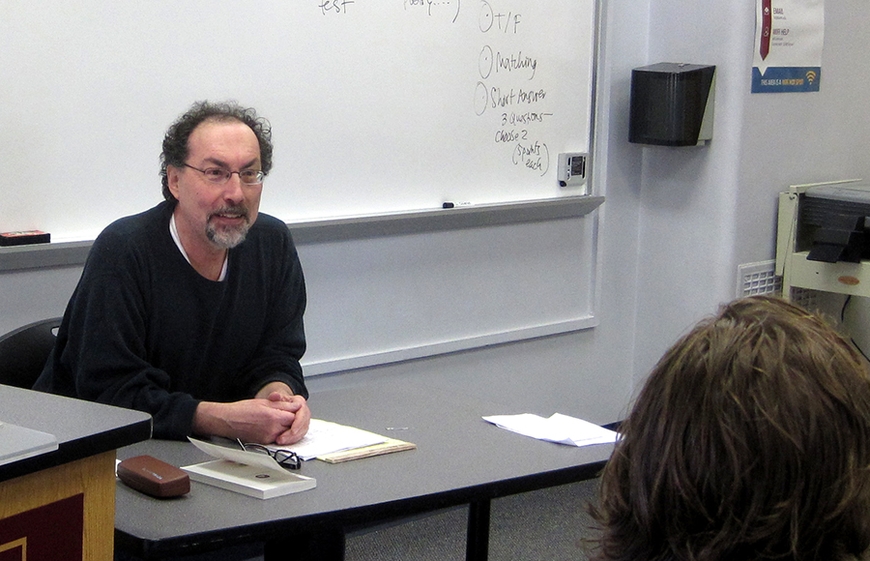Geoffrey Sirc: Starting Where the Students Are
A retired "Emeritus" as of this spring, Distinguished University Teaching Professor Geoffrey Sirc (PhD 1985) came to the Department of English in 2006 after teaching in the University’s General College for 21 years. He loved helping non-traditional students find their way into quality higher education, he recalls. “It was always thrilling to have someone come up to me and say, ‘I had your writing class five years ago. I graduated, and now I’m getting a Master’s degree in Criminal Justice.’”
In English, Sirc expanded undergraduate offerings with courses on the operas based on Shakespeare and the language of hip hop: the latter was also the topic of a department summer institute for high school students that Professor Sirc co-led and -taught in 2008 and 2009 with Twin Cities artists Shá Cage and E. G. Bailey. A scholar of composition theory and pedagogy, he was recognized at the 2014 Conference on College Composition and Communication for his achievements in the field, and he has won multiple outstanding book awards, including the Ross Winterowd Award for his classic English Composition as a Happening (Utah State UP, 2002). Sirc served as Interim Chair of English in 2009-2010.
"The Iliad has always been
at the top of my list of
‘Books to Finally Read in
Your Retirement,’ and so
as soon as the semester
was done, I read it. What
a book." - Geoffrey Sirc
What courses have you most enjoyed teaching in these last years?
I loved doing my sections of “Textual Analysis” around all the various writing—novels, short stories, non-fiction, letters, and journals—of Henry James. Such a singular, important author that hardly any of my students knew. Fascinating plots, incredible sensibility, and the most brilliant stylist ever. Plus, his work attracts the most interesting criticism.
Even better: the past several years of Shakespeare, bringing to bear my training in rhetoric to help explain to students how that amazing writer works. Shakespeare was the Master Rhetorician, so I took a heavily language-oriented approach, first explaining to students what the rhetorical figures were, how much they dominated Renaissance textuality, and how they helped determine Shakespeare’s craft. After we got the figures down, we’d start focusing on the Sonnets, because each poem is such a powerful DNA sample of his work: showing not just themes and “characters,” but his reliance on image-clusters, and the use of the rhetorical figures (in every sonnet he uses several figures). Then we shifted to the long poems, seeing the same thing, and finally the plays as a logical extension, a capstone of his rhetoric. I think it helped students really see him as a craftsman with a consistent textuality throughout his career.
You're a decorated teacher—the U’s highest undergraduate teaching recognition, the Horace T. Morse-Minnesota Alumni Association Distinguished Teaching Award, as well as the Conference on College Composition and Communication Citation for Outstanding Classroom Practices. Has your teaching changed since the 1980s?
Not really. I’ve always tried to start with where students are (so awareness of what they bring, in terms of a knowledge base, to the class, and how that can be built on—e.g., my interest in hip hop as a “bridge” to academic literacy). I’ve always valued shorter writing assignments as a way to let students tap into, and build on, any sort of vibrant, “voiced” writing style they have. You can tell just as much about a writer from how he/she works in a couple sentences as you can from a 10-page research paper. So lots of things like “Top Ten Lists” or mixtape playlists (asking students to come up with Hamlet’s mixtape, and write a bit about each song, makes for quite a fine “alternative” essay on Hamlet).
In the past several years, I showed Shakespeare or Verdi opera productions, and had students keep a running “performance log” while they watched: those were some of the most amazing samples of student writing I’ve ever received. Most every student turns out to be a natural-born reviewer with a powerful critical lens, a strong reception-mechanism, and a very tart sensibility.
What is the most intriguing/enjoyable book you've read this year?
Over the past 20 years or so, The Iliad has always been at the top of my list of “Books to Finally Read in Your Retirement,” and so as soon as the semester was done, I read it. What a book. I was unprepared for the level of violence. Almost the entire work is brutal violence worked by one man on another, described in such grisly detail—spears entering heads, rocks severing jaws from skulls, heads chopped off by swords. And the violence not only saturates life, it’s so maddeningly ritualistic, and so matter-of-factly inevitable. How depressingly similar to today. Plus, to see the gods portrayed as such petty, childish, selfish, vain, egotistical beings, with their smug, arbitrary intrusiveness into mortals’ lives. Well, I guess so. And Achilles is such an amazing hero: he causes the whole brutal story because he’s miffed, and has to live with the idea of this imminent death-sentence hanging over his head. The last book, with Priam begging for the body of his son to be returned. Can’t recommend it highly enough.
Are there non-academic interests you look forward to exploring?
In terms of interest, I’m hoping to 1) live a while longer (that’s a lovely non-academic interest I very much look forward to exploring), and 2) keep writing.



